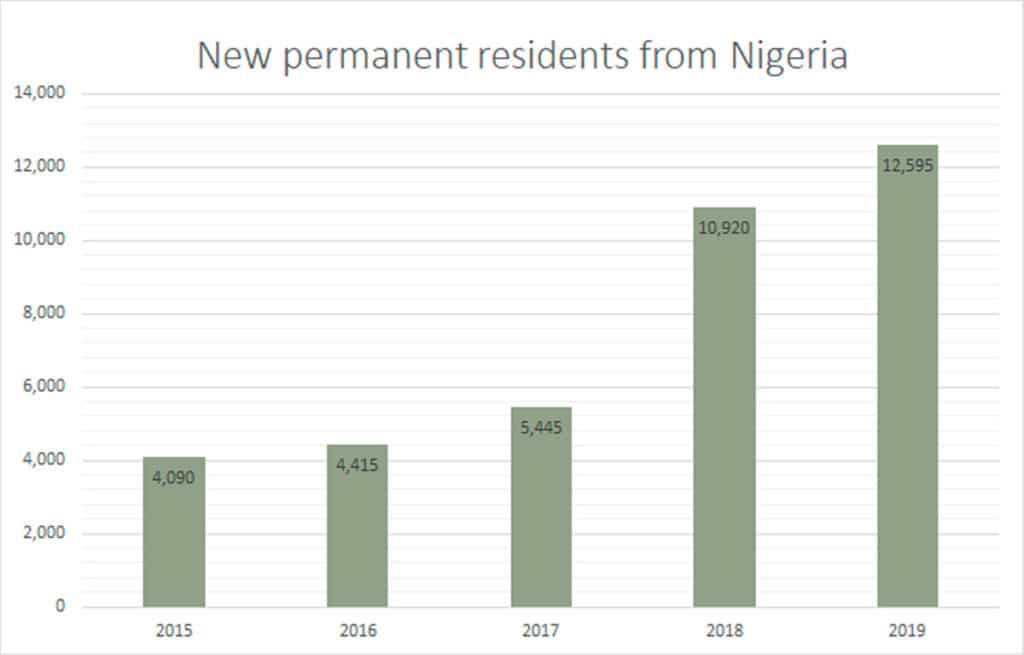While the U.S. blocks immigration visas, Canada building strong Nigerian community
U.S. President Donald Trump has expanded a controversial travel ban to include immigration visa restrictions on Nigeria and five other nations. In Canada, however, Nigerians belong to one of the fastest-growing diasporas in the country.
Nigeria, Myanmar, Eritrea, Kyrgyzstan, Sudan, and Tanzania will be barred from obtaining certain types of U.S. immigration visas beginning February 21. The proclamation said these countries are either “unable or unwilling to improve their information-sharing” with the U.S. or they “presented serious terrorism-related risks.”
As a result, many American citizens and Nigerian immigrants will not be able to reunite with their families.
Akatavweragbon Salowo, a blogger who calls herself “Ak” for short, immigrated to Canada from Nigeria in 2018. Like many Nigerians, both in the U.S. and abroad, she felt targeted by Trump’s latest travel ban update and questioned the logic of blocking immigration from Africa’s most populous country.
“I imagine there will be a lot of Nigerians moving to Canada (from the U.S.),” Salowo told CIC News.
Canada does not consider a person’s country of origin when determining which immigration candidates qualify for economic-class immigration programs.
Last year Nigerians were the fourth most represented nationality among new permanent residents. About 12,595 permanent residents in 2019 were from Nigeria, which is exponentially more than the 4,090 Nigerians who became permanent residents in 2015.

Salowo was one of the Nigerians who immigrated to Canada through the federal Express Entry system.
“I had a great life in Nigeria before I moved, but I think I just got to the point where I was a little restless,” she said. “I felt I was in a bubble and I thought it would be really cool to experience something different.”
Now she writes a blog on her everyday experiences as an immigrant in the Greater Toronto Area. She calls her blog “Black Migrant Girl” in an effort to “deconstruct” what these words mean through her experiences living in Canada as a Black woman from Africa.
“When you say, ‘Hey I am Nigerian,” you never know how people are approaching the conversation,” Salowo said, pointing out common stereotypical assumptions some people have about Nigerians, “A huge chunk of us are passionate and educated and really just want to have a better life.”
My fellow Nigerians, it's America's loss if Trump says he doesn't want you.
Please come to Canada. We are building a strong Nigerian community here in Toronto and across many provinces here.
We'll figure it out together.
— Ak Salowo (@Blackmigrantgrl) February 1, 2020
Find out if you are eligible for any Canadian immigration programs
Immigrating to Canada through Express Entry
Salowo said she chose to immigrate to Canada because it was, “the easiest country to legally get an international passport.”
Canada is the only country with an immigration system like Express Entry.
Like many well-educated young Nigerians with work experience, Salowo obtained permanent residence through the Federal Skilled Worker Program that is managed by the Express Entry system.
She did not have a job offer in Canada, and she had a Comprehensive Ranking System (CRS) score of 441.
When a foreigner decides they want to immigrate to Canada they can enter into the Express Entry pool. Once in the pool, candidates are given a CRS score based on human capital factors such as age, work experience, education, and language proficiency. Then the highest-scoring candidates are issued Invitations to Apply (ITAs).
With an ITA, candidates can submit an application for Canadian permanent residence.
“I was a little worried,” she recalled, “But literally two weeks after I jumped into the [Express Entry] pool I got an ITA.”
Immigration through Canadian provinces
In 2019 it was rare that an Express Entry draw’s CRS requirement would go below 441.
However, Express Entry is also aligned with many Provincial Nominee Programs (PNPs). Most Canadian provinces also have their own programs that can be an option for immigration candidates who do not have high CRS scores.
For example, candidates needed a CRS of 472 in the latest Express Entry draw, but in one recent Alberta Express Entry draw candidates only needed a CRS of 300. Much like the federal Express Entry system, Alberta’s program does not require candidates to have a job offer.
By receiving a provincial nomination, Express Entry candidates automatically earn an additional 600 points over their overall score, which effectively guarantees them an ITA from the federal government in a subsequent draw.
Find out if you are eligible for any Canadian immigration programs
© 2020 CIC News All Rights Reserved
- Do you need Canadian immigration assistance? Contact the Contact Cohen Immigration Law firm by completing our form
- Send us your feedback or your non-legal assistance questions by emailing us at media@canadavisa.com





